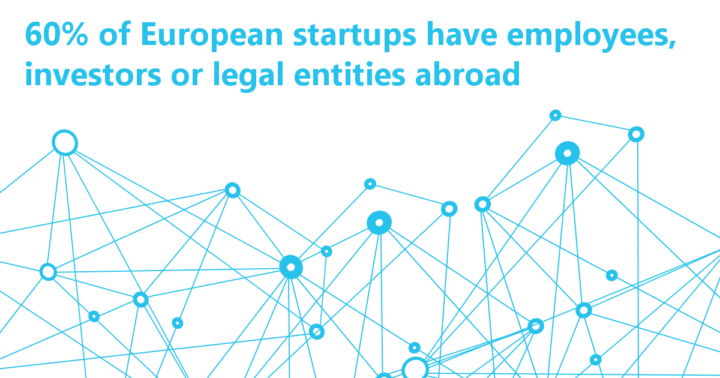When UIPath hit the news in March 2018 with a $1bn valuation it was quickly dubbed Romania’s first unicorn – Even though, the company was by then already headquartered in New York. In Portugal, Farfetch is praised as a Portuguese unicorn – however, a short check on your investment database of choice tells you it is a London-based company.
Did Portugal and Romania loose their best founders? Or are we getting it all wrong?
60% of startup founders in the recent Startup Heatmap Europe survey 2018 stated that their company has either investors, employees or even legal entities abroad. It is a curious number, if you consider for example the competitive spirit we quickly develop when we rank countries by startup success stories. Maybe, we have it all wrong, maybe Niklas Zennstroem’s famous quote of “Great companies can come from anywhere” must be updated to “Great companies do come from everywhere”.
UIPath developed from an IT outsourcing company in 2005 with a tiny office in the less attractive parts of Bucharest, Romania. However, the now-unicorn did not even sell to Romanian customers first, but to an Indian corporate. They received funding from German investor earlybird, Prague-based Credo Ventures and London-based seedcamp and pitched in London before EY’s Romanian branch heard about them and opened doors to sell also in their home country in 2015. Today, the company is headquartered in New York and runs one of its strongest branches in Japan (Business Review 2018). UIPath is the perfect example of the rise of the interconnected startup.
What is an interconnected startup?
It is not known why UIPath negotiated with its initial investors 14 months for its seed round, but it clearly shows, that it is a creative task to find and combine all resources needed to start a global company in Europe, to say the least. To succeed entrepreneurs must find the best talent, the right regulatory frameworks, enough capital and initial market opportunities – and while all of these exist also outside the Silicon Valley, to activate them, founders must travel.
A regional breakdown shows, that this is a pan-European phenomenon with the Nordics & Baltics and the UK leading the pack with over 70% interconnected startups. It is therefore not true, that this is only an effect of poor economies not able to provide sufficient resources to fast growing companies. In fact, even startups in the most developed ecosystems with the highest capital available decide to source certain resources outside their current location. In fact, not completely surprisingly, foreign-based employees are most common in those regions, with 57% of Nordic & Baltic and 62% of UK&Ireland based startups working with distributed teams.
Why do startups branch out internationally?
The international branches of startup companies can have various motivations. Most commonly, talent is hired from remote locations as 43% of all founders stated to work with distributed teams. The hunger of early-stage startups for highly qualified and motivated talent has them bridge distance much more often than SMEs. While one could argue that it is mostly startups in expensive hubs searching for low cost labor abroad, the argument could be also made, that startups are in fact looking for experts in their field, that cannot always be hired in the HQ location. The large appetite for talent that has shown across all our surveys and the high number of foreign employees in all regions, point in this direction. Finally, the diversity of the talent, their varying professional backgrounds and experiences might be a key factor for successful innovation. The same is true for international investors, which is with 29% on average the second largest motivation for internationalization. Legal entities abroad are less common among our survey participants, with only 20% having established those. However, when looking at the Top 100 startups curated by the Startup Europe Partnership 2018, we can see an increase to 63% having offices abroad. This of course must be explained by the maturity of the companies.
Where do startups have their international ties?
For the startups in our survey, the locations for foreign branches are quite evenly distributed. We do see a slight concentration with the UK (12%) and even the US (15%). Only 9% have international ties outside Europe and the US. The Top 100 startups again, have 37% of their second offices in Europe, and already 34% in North America, showing the high importance of the transatlantic relation for startup growth. Only 10% have offices in Asia, which is still not attractive or accessible for European startups. Interestingly enough, of the Top 100 startups, 16 flipped their headquarters outside Europe, mostly to the US, and half of the remaining companies have less than 2 offices abroad (Median = 1.5). In contrast the Top 20 have 10-80 offices abroad (average 25). Among them are Spotify with 46 foreign offices, HelloFresh with 38 and Farfetch with 10.
Looking at these numbers, the pace in which startup companies are generating an international footprint is staggering. The interconnected startup is an undeniable reality and who wants to benefit from this phenomenon or seeks to support its local ecosystem to grow, must radically adapt to this international viewpoint.
Liked this article? Discover more insights on founder mobility, the most attractive startup hubs in Europe and interconnectivity in the Startup Heatmap Europe 2018 report
